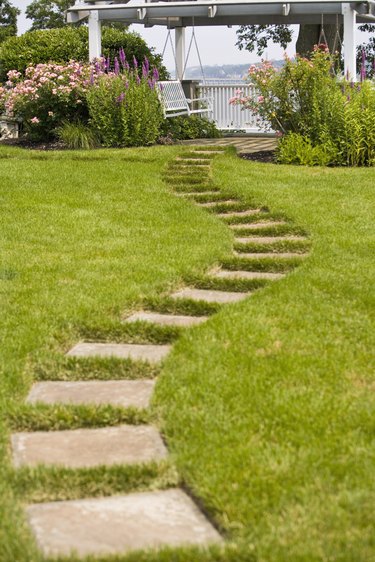
You want the aesthetic appeal of a paver walkway or patio, but you don't want to break your back doing it. While it is true that most people choose do dig down into the earth a little bit in order to remove the surface vegetation and keep their pavers set firmly in the ground, you don't have to go that route. It will still take some time and effort, but there is a way to install pavers with no digging, and in fact, very little heavy-duty work at all.
Things You'll Need
Video of the Day
- Black plastic sheeting
- Flat metal rake
- Tamping tool
- Paver edging
- Hammer or mallet
Video of the Day
1. Lay a sheet of black plastic over the area
Lay a sheet of black plastic over the area and hold the edges down with stones, bricks or your pavers, to kill the grass and any other vegetation that may be growing there. Ideally, do this during a hot part of the year, as this "soil solarization" will kill the weeds and pests by causing them to overheat. If you're laying pavers as a patio, lay plastic over the entire area, plus about 1 foot on each side. For a walkway, lay the plastic about 6 inches wider than the desired walkway area on either side of the projected walkway.
2. Allow the plastic to sit on the area for about four weeks
Allow the plastic to sit on the area for about four weeks, or until all the growth underneath has died away. Lift a corner of the plastic every week or so to check on the progress.
3. Rake the area with a sturdy metal rake
Rake the area with a sturdy metal rake to smooth out the surface. If you're installing a patio, aim to make the area as level as possible, raking more dirt into certain areas if necessary.
4. Tamp down the area
Tamp down the area with a tamping tool.
5. Lay "no-dig" paver edging at the edges
Lay "no-dig" paver edging at the edges of your desired paver area. The installation for this material is different for every brand, but typically, you'll only need to lay down the edging, slide spikes through the holes in the edging, and then use a hammer or mallet to drive the spikes into the ground. Place the horizontal anchor tabs on the edging facing toward the projected paver area, or away from it -- the choice is up to you. Either way, the vertical "wall" of the edging will help hold the paver in place.
6. Spread about 1 inch of paving sand over the area
Spread about 1 inch of paving sand over the area, and then smooth it out with your rake.
7. Lay the pavers over the sand
Lay the pavers over the sand in the configuration you want.
Tips
Since you're not digging down into the ground to install the pavers, your pavers are likely to stick up from the ground a bit -- but that no-dig paver edging you installed will help them stay in place.